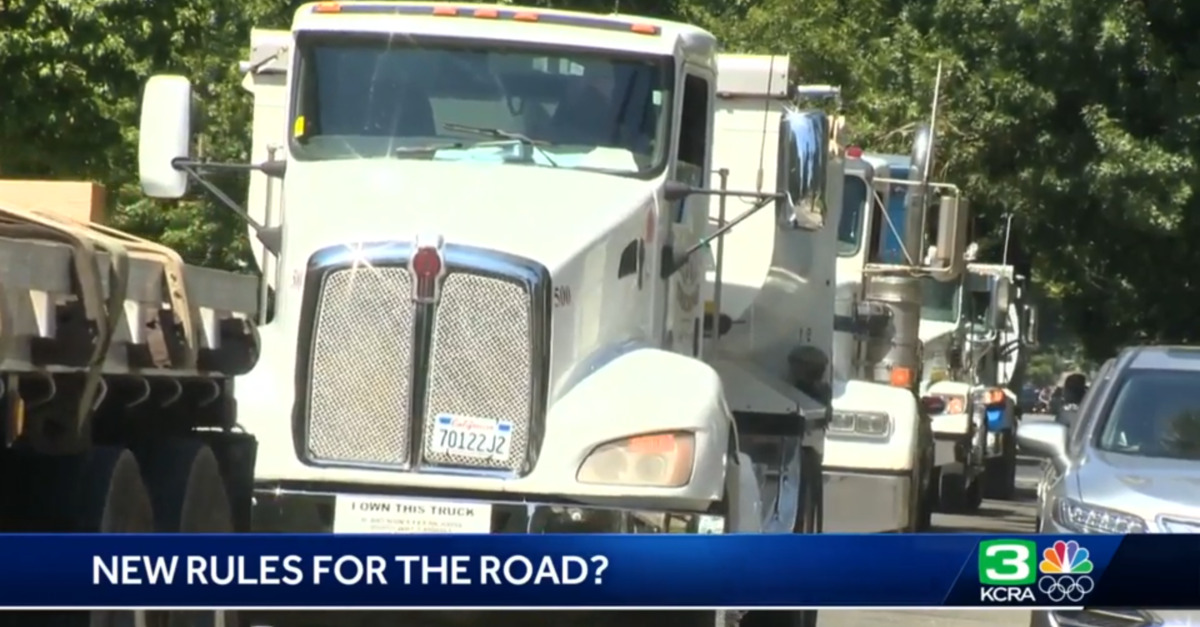
The power of independent trucking has been diminished in the Golden State. On Wednesday, a federal appeals court ruled that thousands of so-called “freelance” California truckers should be classified as employees rather than independent contractors.
The law at stake, AB-5, went into effect on Jan. 1, 2020 but its fate, full reach and potential has been hanging in the balance ever since George W. Bush-appointed U.S. District Judge Roger T. Benitez put the legislation on hiatus, as it applies to truckers, with a temporary injunction on December 31, 2019.
That injunction, sought by trucking industry group California Trucking Association (CTA), was wholly washed away by the U.S. Court of Appeals for the Ninth Circuit in a lengthy and forceful opinion.
“Because AB-5 is a generally applicable labor law that impacts the relationship between a motor carrier and its workforce, and does not bind, compel, or otherwise freeze into place a particular price, route, or service of a motor carrier at the level of its customers, it is not preempted by [federal law],” Circuit Judge Sandra Segal Ikuta wrote.
The CTA had argued that the Federal Aviation Administration Authorization Act (F4A) of 1994, which preempts any state law “related to a price, route, or service of any motor carrier” was the controlling legislation in the case due to its preemption clause.
The Ninth Circuit disagreed, however, because AB-5 isn’t really a law about price rates, routes or services–but, rather, a law that allows state authorities to enforce labor law protections against employers who misclassify their workers as independent contractors.
The opinion explains at length:
[L]aws of general applicability that affect a motor carrier’s relationship with its workforce, and compel a certain wage or preclude discrimination in hiring or firing decisions, are not significantly related to rates, routes or services. Therefore, enforcement of California’s prevailing wage law against motor carriers, the application of California’s meal and rest break laws, and “the use of California’s common-law test for determining whether a motor carrier has properly classified its drivers as independent contractors” are not preempted, because they impact motor carriers’ business at the point where the motor carriers interact with their workers.
Despite the lengthy discussion of the F4A’s potential to preempt the California law, the prevailing issue in the case is whether or not the so-called “ABC test” contained in AB-5 is allowed to stand. Since the CTA’s preemption argument didn’t succeed, the ABC test is now the standard by which authorities can judge whether or not trucking companies have misclassified their employees.
The ABC test is a legal doctrine imported from Massachusetts via case law. The test was recently codified by the state legislature in AB-5 and it determines the employment relationship as follows:
[A] person providing labor or services for remuneration shall be considered an employee rather than an independent contractor unless [(A)] the hiring entity demonstrates that the person is free from the control and direction of the hiring entity in connection with the performance of the work, [(B)] the person performs work that is outside the usual course of the hiring entity’s business, and [(C)] the person is customarily engaged in an independently established trade, occupation, or business.
The district court specifically determined that prong B of the above test was preempted by the F4A and issued an injunction based on the idea that the CTA would likely succeed on the merits of their claim because that prong “effectively mandates that motor carriers treat owner-operators as employees” and therefore “drivers will never be considered independent contractors under California law.”
The Ninth Circuit said the exact opposite was true.
“[W]e have previously concluded that such indirect consequences have ‘only a tenuous, remote, or peripheral connection to rates, routes or services,'” Judge Ikuta notes.
“Because CTA is unlikely to succeed on the merits, the district court erred by enjoining the state from enforcing AB5 against motor carriers operating in California,” the opinion goes on. “By failing to follow our precedent regarding labor laws of general applicability, the district court committed a legal error to which we cannot defer, even at the preliminary-injunction stage.”
Labor leaders hailed the appellate court’s decision as an unmitigated victory for workers.
“Today’s ruling from the 9th Circuit is a massive victory for California’s truck drivers, who for far too long have faced exploitation and misclassification at the hands of trucking companies that place corporate profit ahead of drivers’ safety and well-being,” said the International Brotherhood of Teamsters in a statement. “The court’s ruling confirms that California’s AB 5 law can be enforced against trucking companies that misclassify their workers – and it should be obvious to everyone that drivers who perform work for a trucking company are employees of that company, not independent contractors.”
“With the Ninth Circuit’s decision, we have state law protections to fight misclassification and make clear that these drivers are employees, not independent contractors, entitled to the same rights and protections as any other employee,” Teamsters Port Division Director Ron Herrera added.
[image via screengrab/KCRA]